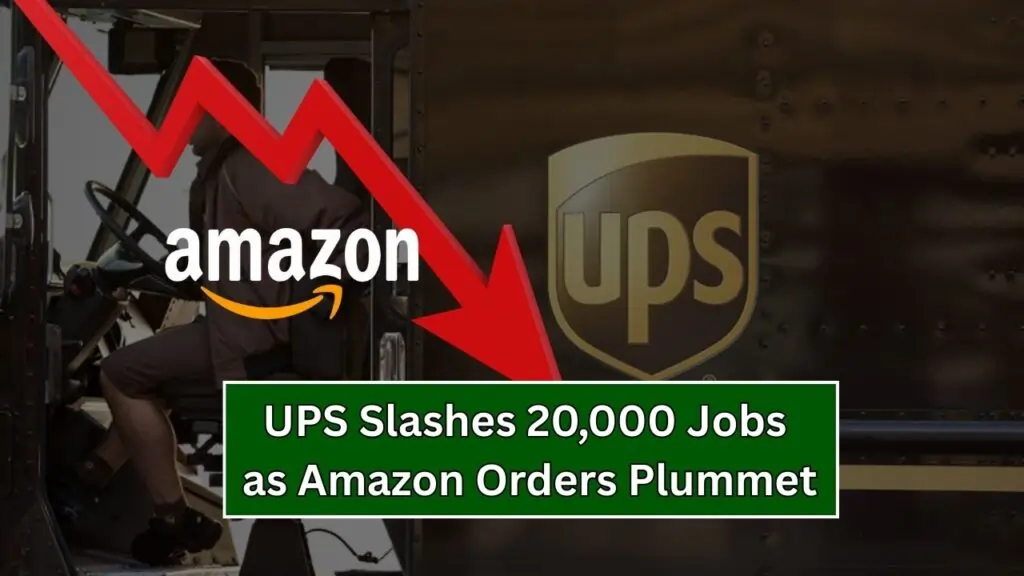UPS Employees: In a move that’s sending shockwaves through the logistics world, UPS is cutting 20,000 jobs over the next couple of years. Along with that, the company is closing 73 facilities across the country as part of a major restructuring.
Why? Amazon , its biggest customer, has seen a big drop in orders.
So what does this mean for your business, your online shopping experience or the overall economy? You’re not alone. Let’s break it down.
Why Is UPS Cutting So Many Jobs of UPS Employees?
UPS has been facing some tough times — chief among them, a big slowdown in Amazon deliveries .
Amazon used to be about 11.8% of UPS’s revenue in 2024. That’s nearly $10.7 billion worth of packages shipped through UPS every year. But Amazon has been pulling back, focusing more on its own delivery network instead of outsourcing to companies like UPS.
This left UPS with high operating costs and low-margin contracts , so they had to act fast. The result? A strategic decision to reduce workforce and streamline.
CEO Carol Tomé said it best: while Amazon brought volume, it didn’t bring profits. So UPS employee is now shifting focus to more profitable clients and services and aiming to reduce Amazon-related shipments by over 50% by mid-2026 .
What’s Behind the Facility Closures?
Along with the job cuts, 73 UPS locations will close by June 2025 . These closures are part of a bigger plan to make the network more efficient.
Think of it like trimming the sails on a ship — when the wind changes, you have to adjust your course. For UPS, that means cutting underused or inefficient facilities to improve speed, cost and service quality.
This will save the company $3.5 billion a year and help them stay competitive in a rapidly changing market.
What Does This Mean for Consumers?
If you shop online, here’s what you can expect:
- Delivery times may slow down especially in areas where UPS reduces staffing or closes local hubs.* Rates may go up as fewer routes and less infrastructure means higher per package costs.
- Saturday delivery or 2-day shipping services may be adjusted.
But don’t worry — UPS says they’re still committed to service, even with these changes.
How Will Businesses Be Impacted?
For small and medium-sized businesses that use UPS for shipping, this means:
- Higher shipping costs if UPS changes rates due to reduced volume
- Longer delivery windows which can impact customer satisfaction
- Need to explore other carriers like FedEx, DHL or regional couriers
Now’s a good time to talk to your current carrier and test other options to keep your supply chain strong.
Business Tips for UPS Employees Changes
Here are a few things you can do:
- Review Your Current Shipping Contracts
Talk to your UPS rep and ask how this will affect your business. Ask about contract changes or alternative service plans. - Diversify Your Carrier Portfolio
Don’t put all your eggs in one basket. Use multiple carriers to spread risk and ensure continuity. - Optimize Your Delivery Routes and Logistics
Is your distribution model still working? Maybe a nearby warehouse or fulfillment center would reduce delays. - Communicate With Customers
If delivery times change, tell your customers early. Transparency is key to building trust and managing expectations.
Other Shipping Options to Consider
As UPS restructures, other companies will fill the gap. Here are a few to look into:
- FedEx : Great for express shipping and business-to-business deliveries
- DHL : Strong international presence; e-commerce solutions
- Regional Carriers : Smaller companies offer faster, personalized service at lower cost
- 3PL providers : If you’re growing fast and need flexible fulfillment support
FAQs FOR UPS EMPLOYEES
Will my package still arrive on time?
It depends on your location and UPS’s network changes. Some areas will see slower delivery times.
Can I switch carriers without losing efficiency?
Yes — many businesses use multiple carriers to stay reliable and cost-effective.
Is UPS the only one affected by Amazon’s pullback?
No. FedEx and others are also seeing changes as Amazon builds its own delivery network.
Will my shipments get lost or delayed?
Not necessarily — but now is a good time to monitor tracking and communicate with customers.
